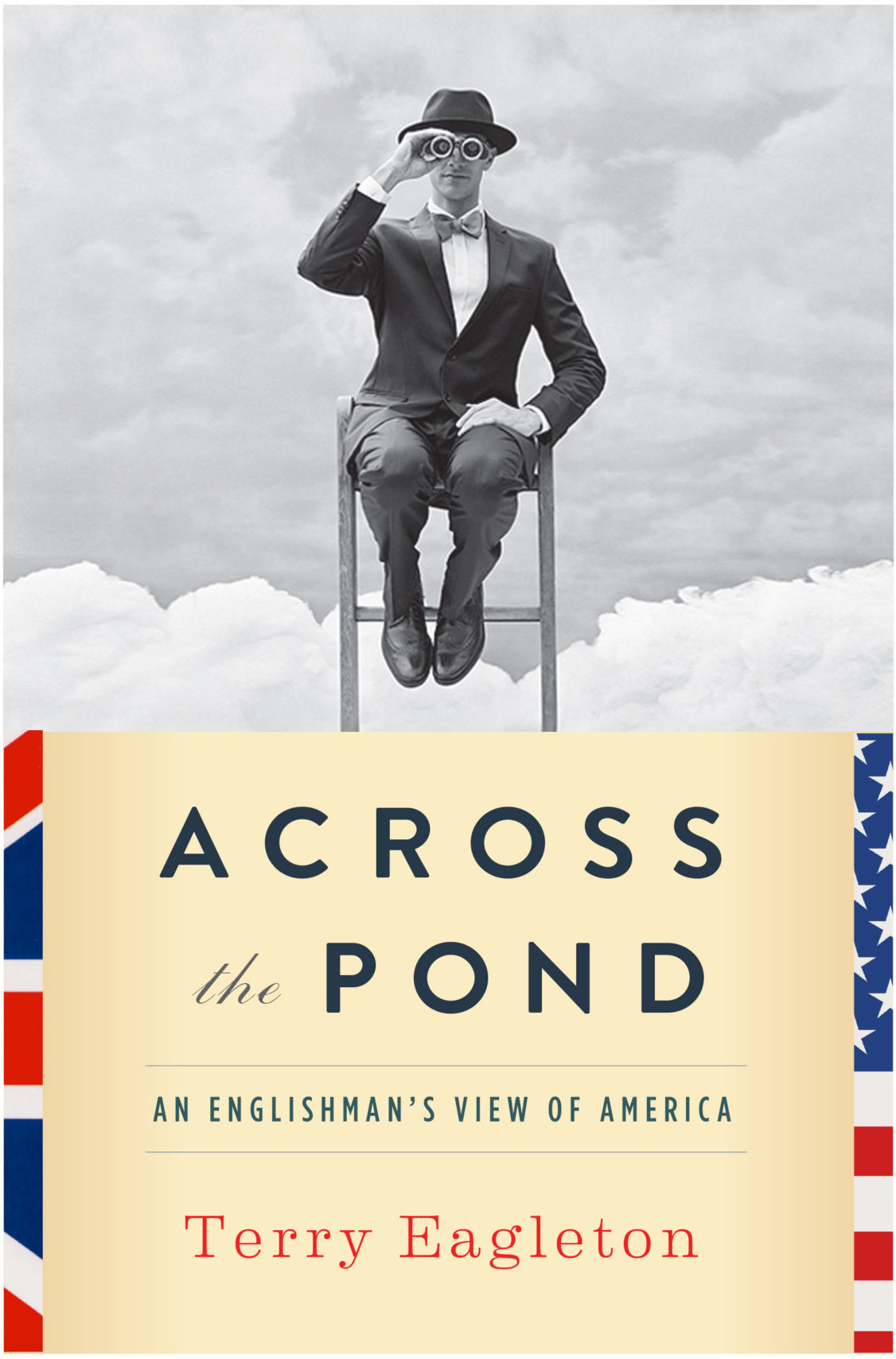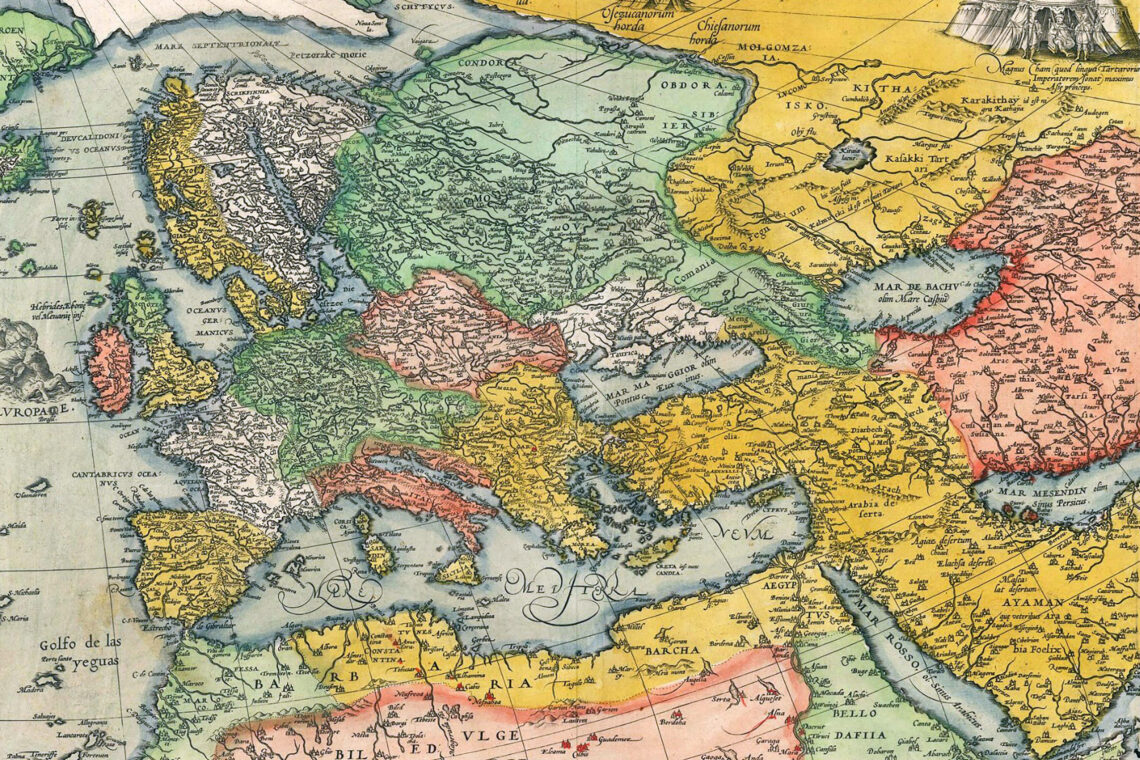There are few more delightful moments than walking with the pugilistic literary and cultural critic Terry Eagleton, the Marxist theorist who always speaks his mind as he sees fit. In his latest book, Across the Pond, the prolific writer ventures out to make sense of America by relying on British lenses, even though the book cover says he is speaking as an Englishman. Both titles—American and Englishman—hide multiple legacies and identities, but Eagleton uses such designations for the sake of having a discussion. Generalizations, he tells us at one point, are both reductive and inevitable.

One might, for instance, find it reasonable to assume that “people in Butte, Montana, are not typically dandies and aesthetes who lounge languidly around town wearing loose crimson garments and reciting aloud from Dante’s Purgatorio, or at least those who do would be well advised to walk warily at night.” Or that Chicago is a busy city, even though pockets of sublime serenity do exist within its borders. One could also justifiably claim that Americans are more expressive than Scots. “There is probably more grinning per square yard in Arizona than there is in Aberdeen,” Eagleton writes. In fact, so many American evangelicals are grinning that one might be excused for believing that “the Gospel is not about being crucified but about being cheerful. Perhaps,” Eagleton adds, “these people have stumbled on a lost version of the text. . . ”
It is quite true that Americans and Englishmen are as divided as they are united by their use of the English language. Americans use “like” to avoid sounding definitive or unequivocal, say “sorry” for no good reason at all, “love” everything, “buy into” ideas, substitute the word kid for child, and expatiate instead of talk (an entire café or restaurant is forced to listen to a private conversation). They like the idea of leadership; they are oversensitive about challenging other people’s beliefs; they can’t speak on television without a teleprompter; they can’t often articulate a coherent, jargon-free English sentence; and, what’s distressing to me, they have abandoned the rhetoric of Thomas Jefferson and his likes for the plain-speaking exhortations of Judge Judy. In addition, Americans have a woefully undeveloped sense of irony and style. “To find the cosmos mildly entertaining has always been a sign of power in Britain. It is the political reality behind Oxford and Cambridge wit. Seriousness is for scientists and shopkeepers.”
The two nations are divided by looks and manners, too. The actor Hugh Grant can only be English and Prince Charles cannot be Texan, “though if the Texans wanted him in, there are those among us who would have no principled objection.” Similarly, Dwight Eisenhower, Billy Graham, Richard Nixon and Julia Roberts are as American-looking as anyone on can ever be. The only possible exception is Mitt Romney who seems to be one gene ahead of them, since he “looks more American than Mount Rushmore.” Finally, an Englishman knows she is in the company of American women if the latter nod to their own statements.
To our British critic, Americans are surprisingly kind and generous, given that they live in a ferocious capitalist system; but they are also given to “emotional theatricality,” which might make one wonder how much of their friendliness is actually genuine. “There is certainly a good deal of automated pleasantness, compulsive cheeriness and manufactured bonhomie,” Eagleton observes, yet people in New York touch each other far less than Brazilians in Rio do.
Eagleton’s eye roams promiscuously over everything that comes his way. As an academic, he finds it strange that faculty are hired, not appointed, as they are in Britain. “One hires plumbers, not professors,” he adds without blinking. A bumper sticker stating “My Child is on the Honor Roll” would endanger the life of its owner in England. Singing the virtues of family doesn’t quite mesh with the message of the New Testament. “Jesus, Mary and Joseph are a curious parody of one,” he notes. In fact, to be a good Christian one must hate his natural parents.
Americans are open to experiences, but they don’t really know what a teapot is and many would not notice if New Zealand were ever to sink in the ocean. As tourists, Americans go everywhere, but they don’t look at anything—only their cameras do. This leads Eagleton to suggest that they are better off sending their cameras instead and having the photographs taken for them and save themselves a lot of money.
Are Americans obese because they have so much space? Whatever the case may be, they do seem to have a complicated and, ultimately, tense relationship with their bodies. In this, as in most things, Americans don’t do things by halves. “Some people are surreally fat, while others are life-threateningly thin.” If the poor tend toward obesity, the well-off, as the New York Times columnist Frank Bruni reported, are hiring personal trainers the same way Woody Allen characters seek psychoanalysts. The body, not the mind, seems to have become America’s measure of well-being. But this is a Western malaise. As with most things, what starts out as American ends up being global.
Americans have no interest in tradition and value innovation; in this sense, they are “natural avant-gardists.” Although they live in a “grotesquely unequal society, its everyday culture is a good deal more egalitarian than that of Britain. There is a genuine classlessness about America’s behaviour, if not about its property structure.” Coming from a life-long Marxist, this is quite a compliment.
Such an observation doesn’t take away from the fact that business is the indisputable deity of America and rules it people like a jealous god. “There is no mystery how men in tall black hats ended up as cigar-chewing Hollywood moguls,” Eagleton reminds us. Entertainment sells. Still, Peter Buffett, the son of the billionaire sage, can write for the New York Times downplaying the feel-good culture of philanthropy and expressing a preference for a more egalitarian economic system. Buffett’s case, as with most his fellow citizens, shows just how much Americans are torn between the temptations of wealth and the call of the spirit. This is one aspect of American life that hasn’t changed since the first pilgrims landed on Plymouth Rock.
I have enjoyed reading Eagleton since I was first assigned his classic Literary Theory in the spring of 1984. His vast knowledge, left politics, and exceptional facility with language combine to give him the strength of a cultural guide who almost leaves no room for dissent. He is also very funny. I laughed out loud many times when reading Across the Pond on a plane from Madrid to New York. His sharp style may rub many Americans the wrong way and his raw verdicts could come across as ill-considered. What is one to make of his statement that the United States “is a cosmopolitan power which can sometimes display the parochial outlook of a medieval peasant”? Or that much of America’s “acquaintance with other countries has been down the barrel of a gun”? Such an attitude could lead to a global apocalyptic war, from which only the perennially opitmistic and irrepressibly entrepreneurial instigators could come out alive and start remaking the world all over again. This is the paradox of America—it builds and destroys. But then it builds again.
This is the best Eagleton can do within the scope of his principles. Just when I finished reading his book, I came across a different take on New York by the British historian and travel writer Jan Morris who has been visiting New York every year, without fail, since 1953. This would be his sixtieth. After more than half a century, he still finds the city fascinating and its people unfailingly decent. One could say that New York is not quite the United States—and I wish Eagleton had spent a paragraph or two on the Big Appple—but it still displays the American spirit in a tight and hectic urban milieu.
Despite its punitive Puritan tradition, ceaseless involvement in world affairs, and dangerously divided society, America’s robust democratic spirit and can-do attitude will continue to thwart attempts to reduce it to a textbook example of empire or a British-style hegemonic power. One thing I have learned is that continent-size America reveals itself gradually, speaking to newcomers in different tones as they move from one age and mindset to another. And as I continue to watch the world plunge into all kinds of turmoil, I am even more convinced that the United States, with its “natural avant-gardists,” can still offer precious lessons to struggling nations and economies.
Let us make sure we celebrate the American spirit before it’s too late.




Comments are moderated by the editor and may not appear on this discussion until they have been reviewed and deemed appropriate for posting. All information collected is handled in a manner consistent with our privacy policy.